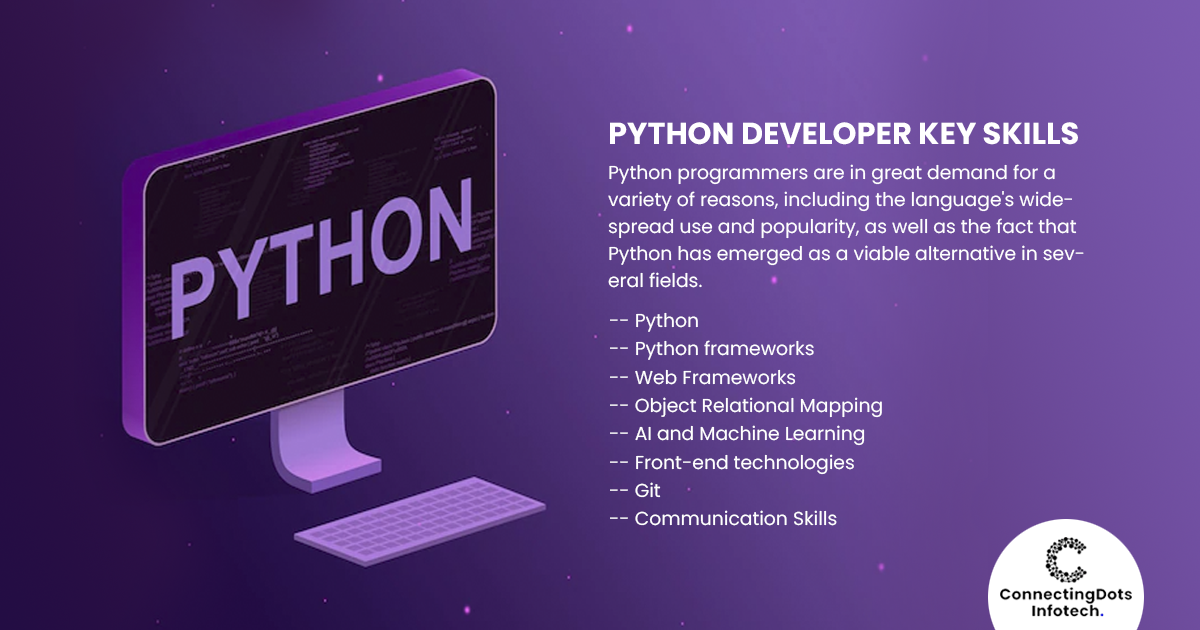Python Developer Key Skills

Python programmers are in great demand for a variety of reasons, including the language's widespread use and popularity, as well as the fact that Python has emerged as a viable alternative in several fields. Web applications, data science, and machine learning are all included. But simply being fluent in the language is not enough. That could be the simplest step to becoming a Python developer, which is surprising. Here are the top skills of the Python developer.
Python
Python will obviously be the primary language you utilise at work to complete the project. Fortunately, switching languages may not be difficult if you are a developer who has concentrated on other languages. It is both beginners- and experienced-developer-friendly due to the reasonably simple learning curve! However, independent of core syntax and semantics, it is at least necessary to understand the distinctions between Python 2 and 3. Because differentiation is rarely needed, it is not a major concern, and a smart Python developer can easily adapt to it. It's also a good idea to be familiar with Python's data structures. Although you don't need to memorise how to use a b-tree, being aware of what a set, dict, or list is made of will be useful in both small and large projects.
Python Frameworks
A Python developer does not need to be familiar with every Python framework. You could be required to know one or more, although Django, Flask, and CherryPy are the most often utilised. If you are familiar with Python, there is little question that you have worked with at least one of the most well-known frameworks. When determining the fundamental logic of an application, developers typically prefer the simple and clear structure provided by frameworks.
Web Frameworks
You need to know what web frameworks are and how to utilise them outside of the Python Core. You may create and deploy web apps using these technologies. Your Python skills will be constrained unless you have some experience with web frameworks.
Django and Flask are the two most well-liked web frameworks for Python. A high-level web framework called Django promotes quick, tidy, and practical design. Developers may build high-quality web apps with Django's extensive library offering without having to invent the wheel.
Flask is a microweb framework that lacks a database abstraction layer, form validation, and other popular features offered by third-party libraries. It is categorised as such since it is independent of any specific tools or libraries. With Flask, you can create web apps without having to write any low-level code, as it comes with its own modules and frameworks.
Web apps are essential in the contemporary, mobile-first society we live in today. Understanding Python-based web frameworks are, therefore, essential.
Object Relational Mapping
Using object-oriented computer languages, data conversion between incompatible types is accomplished by the use of ORM. The Python (or other) language may use the virtual object database that ORMs construct. You'll probably be developing web applications, and such apps will need to transfer data from one system to another. This is really hard without ORMs.
Python developers that want to create, read, update, and remove data structures can do so by utilising ORMs rather than SQL.
AI and Machine Learning
There is really no way to avoid artificial intelligence and machine learning in the present world. Even basic web apps can benefit from this cutting-edge technology. In the context of data science, where you could deal with neural networks, data visualisation, data analysis, and data collecting, this is particularly true.
And you'll need to have a firm grasp of Machine Learning Algorithms in order to actually become successful in AI/Machine Learning using Python.
Front-end Technologies
You'll need to have a solid understanding of Python in addition to understanding how your web application's front end will function. You'll need to be familiar with the three main front-end markup languages for CSS3, Python, HTML5, and JavaScript, for this. All three markup languages can be produced by Python using parsers, compilers, and transpilers.
Git
You'll need to start using a version control system as soon as you've mastered the basics of Python. With the help of these tools, you may iterate your code while keeping track of each change that is made. You will benefit from using a version control system in ways that you might not fully comprehend before using one.
Git is the most widely used version control system in the world. Install Git and become familiar with its ins and outs before utilising it. Once you are familiar with how Git operates, you can combine it with a GitHub account to act as a code repository. You may work on your code with other Python programmers using that repository.
Communication Skills
Finally, you need to be able to communicate well, and this goes for any language. Python is a language that you should be able to utilise in a professional setting with a team once you have a firm knowledge of it. You must have strong communication skills to do it. Even if you are the best Python coder in the world, without this specific expertise, it will be difficult for you to get work.

Conclusion
Beyond these, you'll need more abilities, but if you have mastery of the ones on this list, any organisation would be fortunate to have you on board. Just keep in mind that the Python Core serves as the foundation for everything. You can build on that and be successful.
